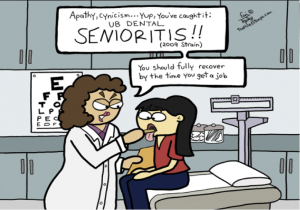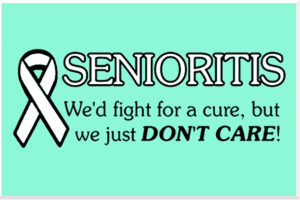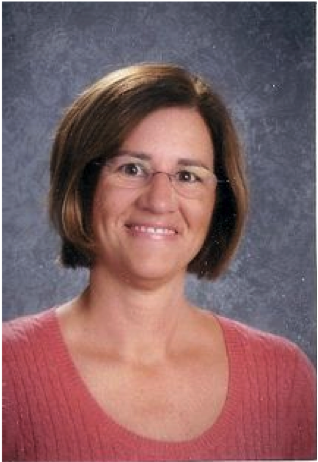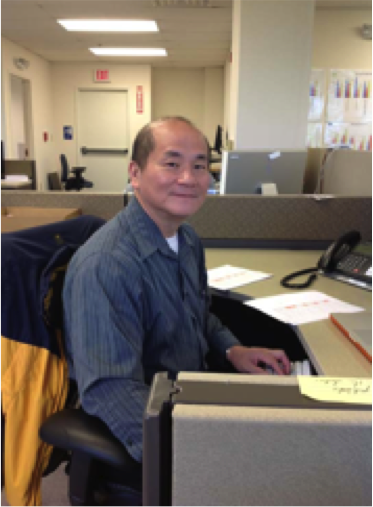In this post, 21CCCS Senior Hannah B. offers up a few tips to help combat Senioritis!
Senioritis
Written by Hannah B.
Hello, everybody, and welcome to Quarter 4 of the school year!
By this point of the academic year, most students are itching to ditch their endless studying, writing, and test taking to enjoy sleep and sweet, oh-so-wonderful summer vacation. Graduating seniors are experiencing this utter anguish to an even further level of misery, believe it or not. Indeed, I can say with complete certainty that the majority of the 21CCCS Class of 2014 are suffering from the crippling, weighty, draining battle known as senioritis.
Senioritis:
Noun: A crippling disease that strikes high school seniors. Symptoms include: laziness, an over-excessive wearing of track pants, old athletic shirts, sweatpants, athletic shorts, and sweatshirts. Also features a lack of studying, repeated absences, and a generally dismissive attitude. The only known cure is a phenomenon known as “Graduation.”
For those of us who are graduating in the next few months, the senioritis mindset can very easily creep into our normal routines. College application are done, our acceptances are known, our past three quarters (and years!) of grades are behind us, and most of our difficult decisions for next year have been made. If you’re feeling anything like me, all you want to do is listen to music, go outside, hang out with your friends, shop for summer clothes, take a roadtrip, Facebook/Twitter creep on people, attempt to take every quiz on Buzzfeed, obsessively daydream about Hunter Hayes (alright, that last one might just be me), and literally do anything that isn’t school work.
Commiserate with any of these symptoms or behaviors?
Yes.
Yes!
YES!
If you’ve identified with any of these descriptions (seriously, who are we kidding here?), then you are most likely suffering from senioritis, my friends.
While senioritis can really bog us down, make us lazy, make everything seem pointless, and create general feelings of apathy, there are a few ways to beat this malady! Here are a few tips and tricks to conquer this beast of dispirit so we can make it to GRADUATION!
- Make “To-Do” lists:
Writing down a list of everything you have to complete for the day, week, month, etc. is a great way to make all of your work seem more under control. Being organized and knowing exactly what you have to do to finish a task can immediately ease your stress levels and even increase productivity.
- Find your productive place:
Experiment with different locations and environments until you discover where you feel most comfortable, motivated, and industrious. Whether you enjoy working in your room, sitting in your kitchen, going to a coffee shop, blasting upbeat music, working in complete silence, staying in one spot all day, or moving all over the place every hour, find what makes you feel good and immediately dedicate a study session.
- Sweat it out:
It should come as no surprise that movin’, shakin’, and sweating can relieve stress. Thank goodness for endorphins! Having a fun workout not only increases your health, but exercising can also clear your head and reset your motivation.
- Go to class/visit the VO:
Believe it or not, skipping out on classes and avoiding the VOs can actually distance you from your schoolwork. If you’re feeling upset, worried, or apathetic about your work, talk to your teachers! They will undoubtedly make you feel a smidge better. That’s what teachers are for, you know.
- Don’t procrastinate:
Although pushing work aside to have some fun is extremely tempting, don’t allow yourself to fall off the wagon. Once you are behind in your work, trying to catch up is even more dreadful than doing your schoolwork in the first place. Try to fight off your gnawing desire to burn your books and crash your computer for just a few more weeks!
- Start a countdown:
Make a virtual countdown clock or mark your calendars for June 5th! Seeing exactly how many days are left in this school year and being able to cross off the next two months one day at a time can be quite liberating.
- Reward yourself (and maybe go a little crazy):
While continuing to work hard is vital at this point of the year, don’t forget to reward yourself for all your effort. Do something that you love or try something new! Take a walk, play guitar, make some art, go see a movie, crank up some music, take a drive, climb a rock wall, sing into a hairbrush (badly, if you’re me), or scream to the sky. Let yourself be free for a moment in time!
REMEMBER:
Every piece of research you find, every study session you live through, every test you take, and every assignment you submit makes you one-step closer to graduation and, most importantly, nearer to summer freedom!
~ GRADUATION 2014 ~






